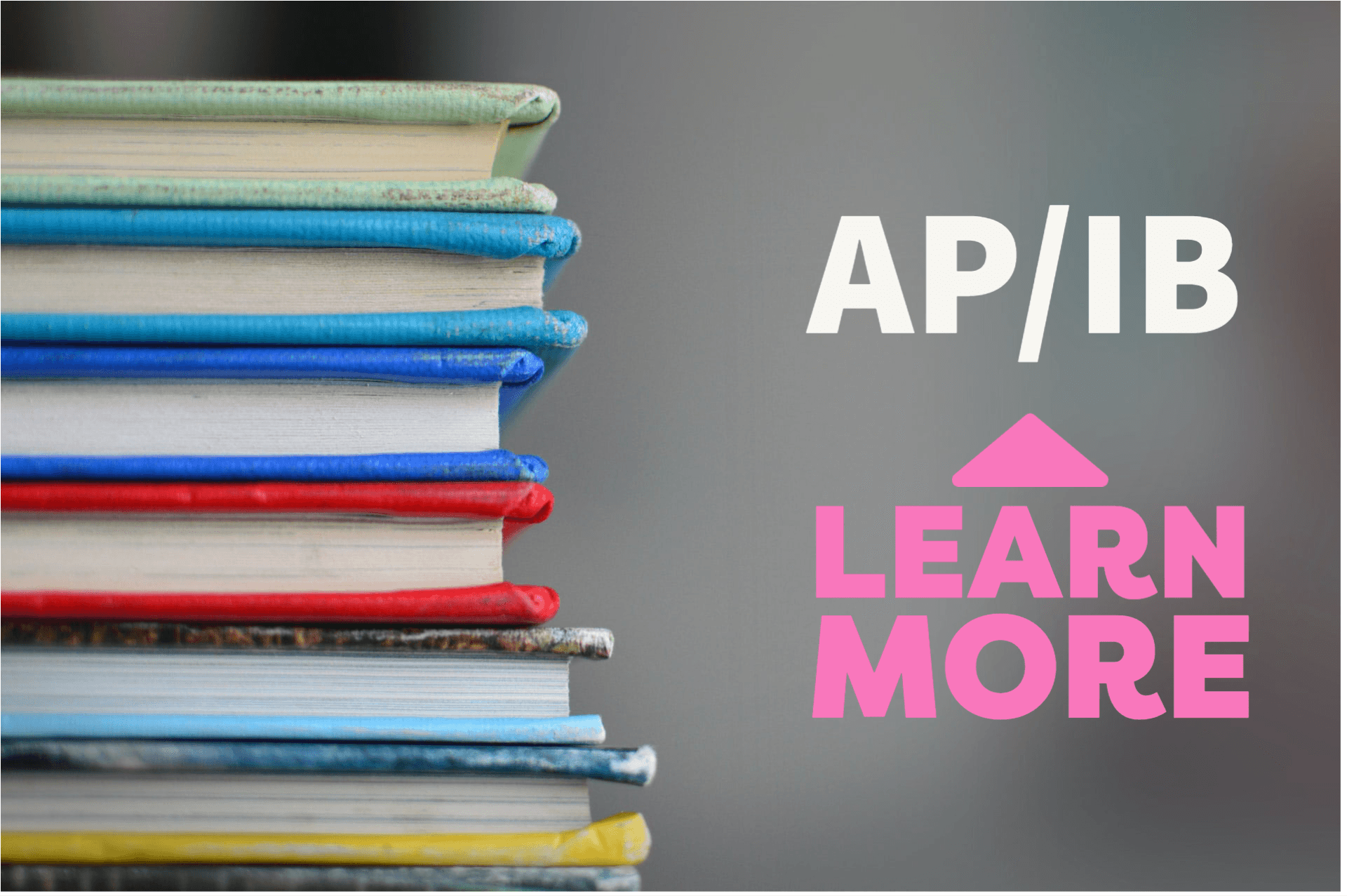- Published on
- Jul 13th 2022
Are Advancement Placement(AP) and International Baccalaureate (IB) Programs worth the hype?

As the college admissions process becomes increasingly competitive, there has been a
significant uptick in the numbers of students taking Advanced Placement (AP) or International
Baccalaureate (IB) classes.
An Advance Placement (AP) course is a college-level class that is designed for high-school
students. There are 38 AP courses available to high school students; however, your school may
choose to offer only a selected few. All AP courses are created and offered through the College
Board.
The International Baccalaureate (IB) Diploma Programme (DP) is a European-based academic
program for 16-19 year olds across the world. Students may enroll in a comprehensive and
balanced two-year Diploma Programme or may choose to take only particular DP subject
courses offered at their school.
Why should a student take AP/IB courses?
- AP/IB courses on your high school transcript demonstrates your commitment to tackle and complete college-level work. Rigor of the student’s high school curriculum is one of the top considerations in admissions review. When college admissions officers review applications, it gives them confidence that the student can successfully handle the rigor of college courses. Performance in AP/IB courses has been found to positively correlate with student’s performance in college
- AP/IB exams taken for any of the AP courses may help students earn college credits, exempting them from taking some entry level classes
- AP/IB classes allow students to explore their passion and encourage them to push themselves harder in their academic endeavors
- With not many objective criteria remaining in the test-optional world of admissions, and pursuant to discontinuation of the subject tests, AP/IB test scores may play a bigger role in college admissions in the future
Are there any disadvantages in taking AP/IB courses?
- AP/IB courses are being taught to prepare students for AP/IB exams, lacking intellectual depth
- Social pressure to take AP/IB courses is causing a high level of anxiety among high school students and a psychological harm
- AP/IB courses don’t necessarily yield college credits. AP exams are scored on a scale of one to five. Most colleges require the student to receive a score of at least three or four to advance any college credits. IB exams are graded on a scale of one to seven and most colleges give IB credit for a score of 5 or higher. Some highly selective institutions only accept an AP score of 5 or IB score of 6 or 7, and may grant credit for only certain AP courses or only higher level (HL) classes. Colleges may even restrict the maximum number of credits that can be awarded. It is important to check ‘articulation agreement’ on each college’s website for their policy on transfer of credits
- AP courses enrich College Board executives. The College Board is legally a nonprofit corporation, but it operates like a for-profit corporation. Its president makes over a million dollars per year and its upper executives make $300,000 to $500,000 a year in salary and benefits. The Board actively lobbies to get schools to adopt its program and lobbies state governments to provide financial support to get more schools and students into AP courses
While reviewing admissions applications, colleges always defer to the high school profile to understand the opportunities available to students for advanced coursework. Students should be aware that while AP/IB courses taken at their high school will display in high school transcript, AP/IB score reporting is optional and students may choose to report few scores and not others (provided AP scores are not being listed in transcript). Here is an added layer of nuance to the already complex landscape - AP/IB classes in core subjects of math, science and language are considered more valuable in college application review than AP classes in electives, such as art, history or psychology.
Which AP exams had the most and least students with passing rate (3+ score) or with the highest score of 5 in 2021?
| Exam Name | Passing Rate (3+) | 5 Rate |
|---|---|---|
| Chinese Language and Culture (Total Group) | 88% | 57% |
| Art and Design: 2-D Design | 87% | 10% |
| Art and Design: Drawing | 86% | 14% |
| Seminar | 85% | 11% |
| Research | 82% | 14% |
| Spanish Language and Culture (Total Group) | 80% | 17% |
| Spanish Language and Culture (Standard Group) | 77% | 13% |
| Calculus BC | 76% | 38% |
| Japanese Language and Culture (Total Group) | 74% | 48% |
| Physics C: Mechanics | 73% | 24% |
| Italian Language and Culture (Total Group) | 72% | 21% |
| Gov. and Politics - Comparative | 72% | 17% |
| Art and Design: 3-D Design | 71% | 7% |
| French Language and Culture (Total Group) | 71% | 13% |
| Physics C: Electricity & Magnetism | 70% | 33% |
| Italian Language and Culture (Standard Group) | 69% | 12% |
| French Language and Culture (Standard Group) | 69% | 8% |
| Computer Science Principles | 67% | 12% |
| Chinese Language and Culture (Standard Group) | 66% | 19% |
| Computer Science A | 65% | 24% |
| German Language and Culture (Total Group) | 65% | 18% |
| Physics 2 | 65% | 15% |
| Spanish Literature | 65% | 8% |
| Music Theory | 61% | 20% |
| Statistics | 60% | 16% |
| Biology | 59% | 7% |
| Microeconomics | 59% | 19% |
| English Language and Composition | 58% | 9% |
| Latin | 57% | 10% |
| German Language and Culture (Standard Group) | 57% | 7% |
| European History | 55% | 11% |
| Art History | 55% | 12% |
| Japanese Language and Culture (Standard Group) | 54% | 16% |
| Psychology | 53% | 14% |
| Human Geography | 52% | 14% |
| World History | 52% | 10% |
| Macroeconomics | 51% | 18% |
| Calculus AB | 51% | 18% |
| Chemistry | 51% | 11% |
| Gov. and Politics - United States | 48% | 12% |
| Environmental Science | 47% | 7% |
| United States History | 44% | 10% |
| English Literature and Composition | 42% | 5% |
| Physics 1 | 42% | 7% |
_ Source: College Board _
Click here for another view of 2021 AP Score Distributions by each subject from the College Board.
Is more rigor always better?
To probe the validity of "more-rigor-is-always-better philosophy" the University of North Carolina conducted a study and found mixed results. It concluded that college-level courses (AP, IB, and Dual Enrollment grouped together) in high school were predictive of success at UNC, but only to a point. Students with 5 college-level courses in high school had higher GPAs than those with 0 or 1 but had virtually identical GPAs to those with 10 or 11. AP course overload can result in a setback in a student’s success by adversely impacting other classes and ultimately lowering the high school GPA. However, if a student is up for the challenge, from a college admissions standpoint, the course
choice/ curriculum rigor, and performance in them, are valued above everything else. In the words of Rick Clark, AVP and Executive Director of Admissions at Georgia Tech, "It’s great to have involved students, but if they don't do well academically, they won't be around to contribute on campus."
Gain additional insight related to college planning and admissions by joining Free Facebook
Group or Whatsapp group or email Preeti Bhatia, Founder and CEO of SoarHQ Admissions, at
[email protected]. You can also reach her via WhatsApp
Content for this article is provided to us by Preeti Bhatia, Founder and CEO of SoarHQ Admissions. ChaiBuzz is only providing this as a content that benefits readers. This is not an endorsement of any views. There is no monetary compensation involved.
